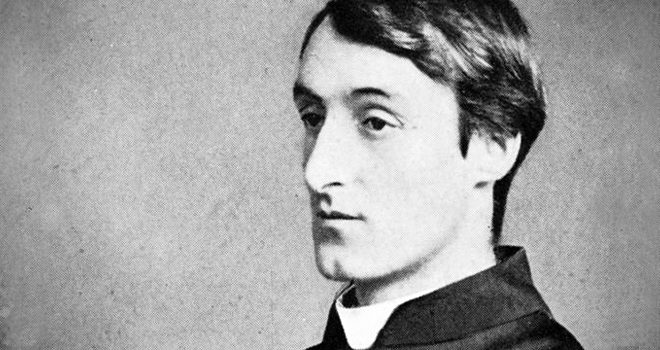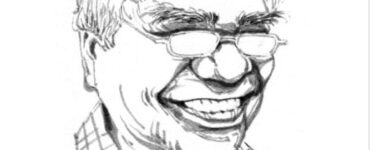Part-7(verses 13-15)
Into the snows she sweeps,
Hurling the haven behind,
The Deutschland, on Sunday; and so the sky keeps,
For the infinite air is unkind,
And the sea flint-flake, black-backed in the regular blow,
Sitting Eastnortheast, in cursed quarter, the wind;
Wiry and white-fiery and whirlwind-swivellèd snow
Spins to the widow-making unchilding unfathering deeps. 13
“Into the snows she sweeps,/Hurling the haven behind ”. The ship is in a deadly hurry, ( “sweeps”, “Hurling” ) as if in response to the beating of the death drum. “Heaven-Haven” is the title of an early poem (1864) by Hopkins, which has a subtitle, ‘ a nun takes the veil. There, a nun asks ‘to be /where no storms come’. In contrast, the nun in The Wreck runs into a storm,”Hurling the haven behind”. Hopkins plays on the name of the German port Bremerhaven, to great effect. The tall nun of The Wreck is setting out not for a safe haven, where there are no storms,but she is “hurling” the haven behind her, as if for the embrace of the storm. The departure, Hopkins doesn’t fail to mention the detail, was on a Sunday. The weather was unkind, “…on Sunday; and so the sky keeps”. The “sky” is not the empty canopy, it is heaven. Hopkins involves the “heavens” in this tragedy at the very launching of the disastrous voyage. And “the sky” is seconded ,by “ the infinite air ”, cementing the suggestion of the divine . The coming storm is not an accident. It is an element of the “infinite” “sky”, and the wreck is a necessary stage in the divine design . The flakes of the sea are as hard as “flint”. Flint is not just any stone. It is sharp and is used to produce fire, and thus “Wiry and white-fiery”. Snow flakes that are by nature soft and cool turn sharp and fiery ( “…the sea flint-flake, black-backed”) : white is black,soft turns sharp. It is a sea of sharp burning flakes of stone. Nature has become unnatural. Hopkins intensifies the account of the storm with poetic effects, like alliteration and oppositions. But he sticks to facts.The wind is in the wrong direction, “Eastnortheast”. And the verse closes with the dark humor of: “the widow-making unchilding unfathering deeps.” The whole history of the inhuman sea in one line; women lost their husbands,mothers lost their sons, children lost their fathers.
She drove in the dark to leeward,
She struck—not a reef or a rock
But the combs of a smother of sand: night drew her
Dead to the Kentish Knock;
And she beat the bank down with her bows and the ride of her keel:
The breakers rolled on her beam with ruinous shock;
And canvass and compass, the whorl and the wheel
Idle for ever to waft her or wind her with, these she endured. 14
The ship drove on its side shielded from the wind, but ran in the wrong direction, and into the ridges of sand (“the combs of a smother of sand”). It was night and the ship couldn’t see anything.It was stuck in the sand, and it didn’t steer itself, but was steered, drawn ( “night drew her”) . It was as if it was already dead and drawn like a lifeless body,( “Dead to the Kentish Knock”: ” Dead ” here means 1.precisely, straight 2.as good as dead. ). The waves rolled over the ship, and waters entered it. The propeller (‘whorl’) was rendered useless. ( The ship had both sails and a steam engine.) “…canvass and compass, the whorl and the wheel / Idle for ever “, it wafted. “For ever”.
Hopkins had prepared us for this “sinking” in the fourth verse of the poem,in which he was describing his own spiritual sinking, like the sand in the hourglass.
“mined with a motion, a drift,
And it crowds and it combs to the fall”. (Verse 4)
Man has to be wrecked , before he could be retrieved. Here, the ship is sinking into the sands (“ …the combs of a smother of sand”), like the sand in the hourglass ( “combs to the fall”) . This verse 14 is connecting the man in the storm with the storm in the man of Part One of the poem. The wreck is a part of the retrieval process.
Hope had grown grey hairs,
Hope had mourning on,
Trenched with tears, carved with cares,
Hope was twelve hours gone;
And frightful a nightfall folded rueful a day
Nor rescue, only rocket and lightship, shone,
And lives at last were washing away:
To the shrouds they took,—they shook in the hurling and horrible airs. 15
Hope is personified in this verse, ( like Patience in Shakespeare’s Twelfth Night) ,but it is a shrouded Hope. Hopkins traces the ages of life Hope had passed in those terribly brief moments before it is shrouded .“…twelve hours gone” seemed a lifetime (“Hope had grown grey hairs”). It had mourning dress on. Anxiety carved trenches on its face, and tears ran down in those trenches. At nightfall, the passengers were “folded”. And finally, Hope was “shrouded”. “To the shrouds they took”: for the passengers were frantically trying to swim to safety, but their safety was in shrouds, in the form of the enveloping waters, waiting for the bodies.
“And lives at last were washing away”: “At last”: the last moments of their lives,those dark “frightful” moments , when they were watching their own lives being washed away. “And frightful a nightfall folded rueful a day”: “folded” , as often, Hopkins uses in its two senses, “folded” by night like sheep for the slaughter.Also,the care of the Good Shepherd, taking care of his fold in danger.Thus, “folded” reinforces the theme of the poem, the dual theme of wreck and rescue, of the cross and the resurrection.
Titbit:
“A great work by an Englishman is like a great battle won by England.It is an unfading bay tree…Art and its fame do not really matter, spiritually they are nothing, virtue is the only good; but it is only by bringing in the infinite that to a just judgement they can be made to look infinitesimal or small or less than great…” ( Letter to Bridges)
*









Add comment